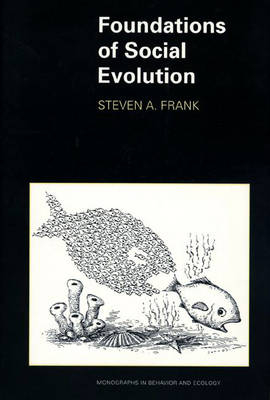
Foundations of Social Evolution
Seiten
1998
Princeton University Press (Verlag)
978-0-691-05933-4 (ISBN)
Princeton University Press (Verlag)
978-0-691-05933-4 (ISBN)
- Titel ist leider vergriffen;
keine Neuauflage - Artikel merken
A theoretical treatment of the evolution of social cooperation and conflict which focuses on game theory, classical models of natural selection, quantitative genetics, and kin selection, combining these with economic theory. The title is part of the MONOGRAPHS IN BEHAVIOUR AND ECOLOGY series, and aimed at economists, mathematicians, and biologists.
This is a treatment of one of the central problems in evolutionary biology, the evolution of social co-operation and conflict. Steven Frank tackles the problem with a combination of approaches: game theory, classical models of natural selection, quantitative genetics, and kin selection. He unites these with economic thought: a theory of model formation and comparative statics, the development of simple methods for analyzing complex problems, and notions of information and rationality. The text begins by developing the three measures of value used in biology - marginal value, reproductive value, and kin selection. It then combines these measures into a coherent framework, providing a unified analysis of social evolution in its full ecological and demographic context. Frank also extends the theory of kin selection by showing that relatedness has two distinct meanings. The first is a measure of information about social partners, with close affinity to theories of correlated equilibrium and Bayesian rationality in economic game theory. The second is a measure of the fidelity by which characters are transmitted to future generations - an extended notion of heritability.
Throughout, Fran
This is a treatment of one of the central problems in evolutionary biology, the evolution of social co-operation and conflict. Steven Frank tackles the problem with a combination of approaches: game theory, classical models of natural selection, quantitative genetics, and kin selection. He unites these with economic thought: a theory of model formation and comparative statics, the development of simple methods for analyzing complex problems, and notions of information and rationality. The text begins by developing the three measures of value used in biology - marginal value, reproductive value, and kin selection. It then combines these measures into a coherent framework, providing a unified analysis of social evolution in its full ecological and demographic context. Frank also extends the theory of kin selection by showing that relatedness has two distinct meanings. The first is a measure of information about social partners, with close affinity to theories of correlated equilibrium and Bayesian rationality in economic game theory. The second is a measure of the fidelity by which characters are transmitted to future generations - an extended notion of heritability.
Throughout, Fran
Steven A. Frank is Professor of Ecology and Evolutionary Biology at the University of California, Irvine.
| Reihe/Serie | Monographs in Behavior and Ecology |
|---|---|
| Zusatzinfo | 2 tables 39 line illustrations |
| Verlagsort | New Jersey |
| Sprache | englisch |
| Maße | 197 x 254 mm |
| Gewicht | 567 g |
| Themenwelt | Naturwissenschaften ► Biologie ► Evolution |
| Sozialwissenschaften ► Soziologie | |
| ISBN-10 | 0-691-05933-0 / 0691059330 |
| ISBN-13 | 978-0-691-05933-4 / 9780691059334 |
| Zustand | Neuware |
| Haben Sie eine Frage zum Produkt? |
Mehr entdecken
aus dem Bereich
aus dem Bereich
Wie die Vernichtung der Arten unser Überleben bedroht - Der …
Buch | Softcover (2023)
Penguin (Verlag)
15,00 €


